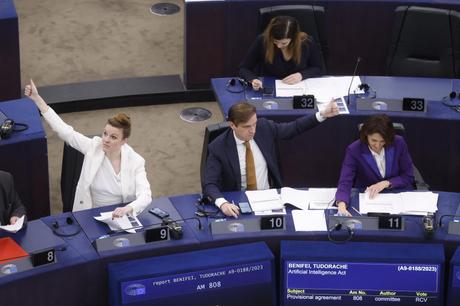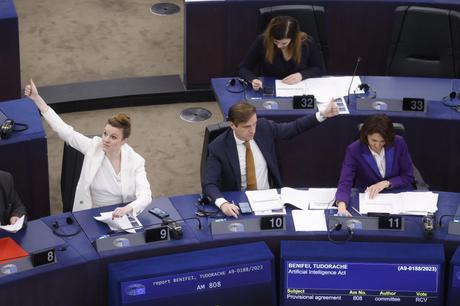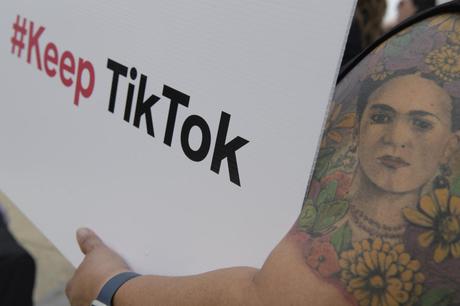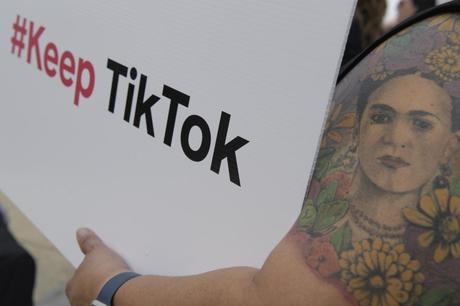It's hard to overstate TikTok's influence on fashion and beauty trends and social commerce, or the impact of AI on virtually any other part of retail. So as both faced major new mandates on two continents on Wednesday, brands began bracing for what could be a momentous impact.
The House of Representatives just introduced a bill that would force social media supernetwork TikTok to split from its owner, China-based ByteDance, or ban the app in the US. The vote passed with overwhelming bipartisan support, 352 to 65, largely due to national security concerns - the same concerns touted by the previous Trump administration that nearly forced the company to sell the platform four years ago . President Joe Biden promised to sign it if the Senate passes it. At that point, TikTok would have five months to find a new owner.
More from WWDMeanwhile, on the same day, the EU passed a major piece of legislation to regulate the development and use of AI. The Artificial Intelligence Act, first proposed in 2021, sets guardrails based on risk levels, from low, medium and high to 'unacceptable', which would justify a ban on the technology.
"Artificial intelligence is already a large part of our daily lives. Now it will also be part of our legislation," Roberta Metsola, President of the European Parliament, said in a post on social media.
The EU AI Act is not yet fully ready
Fundamentally, the EU AI Act is similar to the EU's GDPR (or General Data Protection Regulation) of 2016, in that it aims to protect consumers from bad technology policies, albeit for AI rather than personal data. According to the text, it seeks to monitor and promote the "adoption of human-centered and trustworthy AI," which is a noble goal and one that proved so popular that the regulation passed with a huge majority of 523 votes in favor. only 46 against. It even has fans from the tech sector.
The story continues
Of course it does. There is little discussion about the need for guardrails for such a complex, powerful and fast-growing technology. But that also means that implementation is not a simple matter. In fact, it already looks complicated, maybe even messy. The scope covers multiple facets of AI and extends beyond its creators and developers to partner companies that use their tools. This means that companies operating in Europe struggle to understand what compliance means.
The law contains a number of prohibitions, from the use of AI for biometric identification to social scoring and AI-based manipulation techniques. There are clear violations, such as deepfakes used for disinformation or facial detection used to discriminate. But there are plenty of other scenarios that can plague even well-intentioned people and companies.
Fashion retailers may understand that they need to disclose the use of AI-generated models in a marketing campaign. But would a beauty brand be prohibited from targeting users based on data from a virtual makeup or facial scanning skincare app? Or rank their value as a customer for loyalty purposes? If AI is used to scan customer history and categorize types of shoppers to make product and size recommendations, would that be against the law? When it comes to the nitty-gritty of these types of specific use cases, it's not immediately obvious.
The EU AI Act will come into force in May, but over time it will look more like a rollout than a single launch, with various stages of the law being refined and implemented over the next two years. Whatever that looks like for developers, platforms and the brands they work with, the consequences if something goes wrong are quite severe.
The fines range from 15 million euros, or 3 percent of annual global turnover, to 35 million euros, or 7 percent of turnover. Companies won't be able to sweep violations under the rug either: the law also establishes consumers' right to file complaints against companies about inappropriate use of AI and to demand transparency about any AI-based decision-making that affects their rights.


TikTok's countdown clock is ticking again
As technology makers and brands in Europe grapple with the EU AI Act, companies and makers in the US are staring at the potential of losing a technology platform that for some has become central to their business. Again.
Despite trying to enforce a similar hard line against TikTok four years ago, former President Donald Trump recently appeared to reverse course, in comments suggesting that banning the app would mainly benefit the "enemy of the people" Meta . The House nevertheless passed the bill, making a ban a possibility again.
CEO Shou Chew responded to the rapidly escalating TikTok conundrum on
He's not wrong.
That TikTok has more than 170 million U.S. users is a testament to its enormous influence - and if anyone missed that memo, they may have been made aware of the flood of concerned messages that have flooded lawmakers' offices, facilitated by the company yourself. The Tiktok app directly urged users to contact their representatives and file a complaint.
That wasn't enough for some of the stars and fans, who gathered in Washington DC this week in defense of the app. That set the stage for another TikTok gamble. The company reportedly paid some creators to attend and amplify the protest among their followers, reaching a total of around 60 million followers.


Whether the company's tactics will work remains to be seen. What's clear is that the stakes are high, and not just for TikTok. Brands also feature prominently on the app, whether it's TikTok Shop, garden variety accounts, or creator partnerships.
The company had around 5 million business accounts last year, including household names like Crocs, PrettyLittleThing, PacSun, Asos, Ugg, Vans, Converse, Calvin Klein, Boohoo, Ralph Lauren and many, many others. While some experts have wondered aloud whether the app's outsized influence on fashion retail has begun to wane, its star in terms of trendsetting and inspiration still seems to shine. Just ask Prada. During Milan Fashion Week, the fashion house apparently took a cue from TikTok's coquette trend for its show.
But some of the companies that have the most to lose are smaller companies. Like Juicy Body Goddess Boutique.
The owner, Summer Lucille, told CNN in an on-air segment that since she started promoting her Charlotte, NC store on TikTok two years ago, it has grown into a 15,000-square-foot warehouse and a physical mall location. The experience is similar to that of Jessie Whittington of Ramsey Springs, Miss., who turned her soapmaking hobby into a business called Country Lather Soap Works on the platform. In a promo for the app, she enthused: "TikTok is a fantastic platform for DIY." It's the stuff of dreams and TV commercials.
For Lucille, the prospect of a TikTok ban seems like a nightmare. The fate of the app - and hers - is in the hands of the Senate. Her message to lawmakers: "You're voting against my small business," she said on air. "You're voting against me getting a piece of my American pie."
The best of WWD